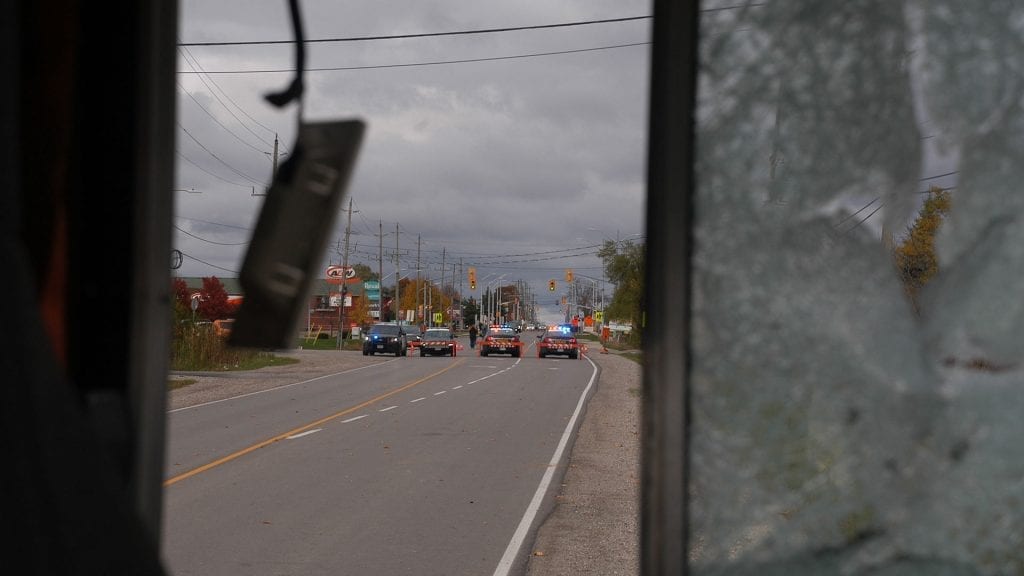
OPP cruisers seen through the window of a bus that was set up on Argyle Street in Caledonia on Oct. 22. Photo: Brett Forester/APTN
More entrenched than it’s ever been, the land back occupation of a disputed construction site in Caledonia, Ont. marked a milestone on Monday.
“It’s been 100 days – 100 days at Land Back Lane,” spokesperson for the action Skyler Williams told reporters from behind the police barricade. “We’re looking really good for winter. We got insulation in our buildings, woodstoves going. It’s looking really well.”
But the milestone was marked by accusations from the Ontario Provincial Police (OPP) that those halting development of the McKenzie Meadows subdivision “falsely blamed” police for escalating the situation during a violent clash that spurred retaliatory blockades and closing of critical infrastructure on Oct. 22.
OPP Commissioner Thomas Carrique posted an undated, one-minute video to social media on Sunday.
The police video shows an individual approaching and striking the window of a cruiser with a lacrosse stick at the intersection of Sixth Line and Argyle Street, where the safety zone support camp is located.
The video then shows another person who approaches the cruiser and cracks the windshield by throwing a rock.
The area is strategically important because it’s across the street from a hydro and pipeline easement access road which leads into the 1492 Land Back Lane camp, which approximately a dozen people established at the 1535 McKenzie Rd. site in July.
“I am extremely proud of the restraint and patience that has been demonstrated by members of the OPP who have been working hard to keep the situation from escalating,” said Carrique in a statement released Sunday. “We will continue to engage in constructive dialogue with demonstrators and members of Caledonia in efforts to keep the peace and preserve life.”
The video had been viewed over a million times on Twitter by Monday afternoon, yet it was accompanied by little context – while the press release that followed attributed the incorrect date to the incident. Several hateful and racist comments were posted on both Facebook and Twitter.
Williams responded Monday by calling the lack of context released with the video “despicable,” suggesting it could act like a dog whistle, stir up racial hatred and agitate an already volatile situation.
“The OPP is escalating this unnecessarily. There’s no reason for any of this to have gotten to the point that it is now,” he said. “There’s no reason to spike this up. This is a federal issue that needs to be dealt with nation to nation.”
Const. Rod LeClair said that the video was taken on Oct. 22 during the skirmish before the blockades. Officers shot someone in the leg with a rubber bullet from a riot-control gun and stun gunned someone else, according to the release.
Read more:
Police violence spurs retaliation blockades, attacks on infrastructure in Caledonia land dispute
LeClair suggested the video was filmed before this use of force while Williams suggested the opposite. People responded by digging up roads, damaging train tracks and re-erecting the Argyle Street barricade.
Police are obligated to enforce the two injunctions which a judge made permanent only hours before the violent clash. A provincial government lawyer has told the court multiple times that police have and continue to enforce the injunctions in three ways: by using force, making arrests and relying on their plainclothes liaison team.
They already raided the camp once, which led to the first round of blockades. A court filing from a senior officer also predicted that infrastructure could be targeted again in response to use of force by police.
Williams previously posted pictures and video of parked cruisers surveilling the area where the skirmish happened. He said Monday that the constant surveillance, despite repeated request that police back off, and mounting number of arrests being made off-site contributed to heightened tensions which precipitated the clash.
“The OPP have been told by everybody in our community to just stay away from us,” he said. “The band council, the Confederacy council, elders in our community have all approached the OPP to say exactly that. That negotiations and that honest and fruitful dialogue is the path forward here, not more police action.”
Watch a report from Annette Francis:
APTN News requested an interview with Carrique on Monday, but he was not available. LeClair sent a statement responding to William’s criticism.
“The social media posts that were issued on Sunday evening by the OPP sought to clarify misinformation that had been circulating on various social media sites that suggested the OPP has responded in a violent way to escalate the situation in Caledonia,” he wrote.
“Arrests have been made using the least amount of force necessary, including facilitating the opportunity for wanted parties to turn themselves in. Any deployment of the ARWEN (gun used for rubber bullets) or conducted energy weapon (Taser) has been done only in response to aggressive actions taken by demonstrators which has included physically assaulting officers.”
Williams said the community needs room to exercise traditional Haudenosaunee consensus-based decision-making protocols and that Canada needs to stop “dragging your feet” and get to the table.
“This is Canada’s new land claims policy,” he said. “How can you have fruitful negotiations when you’ve got the barrel of a gun pointed at you. We’ve been at this for 100 days now and they should’ve been there 99 days ago.”
The Six Nations launched 29 specific claims against the Crown between 1982-1995, including one that argues the former Oneida Township, in which McKenzie Meadows is located, was never surrendered and that the nations were never fairly remunerated for the sale of lands reserve for future occupation or leasing purposes.
Both Queen’s Park and Ottawa have confirmed that they are willing to engage in land talks.
The Crown closed the Six Nations’ land claims in 1995 after the elected council sued Canada and Ontario.
A trial in that suit is slated for 2022.









